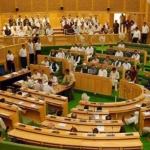The once-vibrant streets of Phalgam, where laughter mingled with the clatter of hooves and the chatter of tourists, now lie silent, shrouded in grief. The terrorists who struck this paradise did not just claim 26 lives—they tore at the very soul of Phalgam. They silenced the ponewalas, whose ponies carried dreams up winding trails. They dimmed the lights of taxi drivers, whose wheels spun stories of visitors from afar. They shuttered the shops, hotels, and guesthouses that were the lifeblood of this valley. But worse, they tried to kill the idea of Phalgam—a place where nature’s beauty meets human warmth, where every stranger is welcomed as family.
From the minarets of Jamia Masjid, curses rain down on those who brought this darkness. The mosque, a beacon of peace, stands as a testament to Phalgam’s resilience, its voice echoing the collective anguish of a town betrayed. The terrorists may have struck with bullets and bombs, but they cannot extinguish the spirit of a people who have long woven their lives into the fabric of this land. The gahma gahmi—the joyous hustle and bustle—that once defined Phalgam is not gone forever. It waits, like a seed beneath winter’s frost, for the warmth of our care to bring it back to life.
Phalgam is not just a destination; it is a dream nurtured by the sweat and smiles of its people. The hoteliers who greeted guests with steaming cups of kahwa, the tour operators who shared tales of the valley’s magic, the shopkeepers who offered trinkets and treasures—they are all Phalgam’s heartbeat. Today, they stand on the edge of despair, their livelihoods crumbling, their hopes fading. The ponies stand idle, the taxis gather dust, and the guesthouses echo with emptiness. Yet, they refuse to surrender. They look to us, their eyes pleading for a chance to rebuild, to revive, to reclaim what was stolen.
We cannot undo the tragedy, but we can refuse to let Phalgam fade into memory. This is a call to every heart that has ever been touched by the valley’s beauty—to those who have walked its meadows, breathed its crisp air, or simply dreamed of its serenity. Visit Phalgam. Not just as tourists, but as bearers of hope. Your presence will light up the streets again, fill the hotels, and set the ponies trotting. Your footsteps will echo louder than any bomb, proclaiming that Phalgam lives. Each rupee you spend will be a lifeline to a family, a spark to reignite a dying industry.
Let us not wait for the world to rediscover Phalgam. Let us, its admirers, its lovers, lead the way. Bring your families, your friends, your stories. Stay in its guesthouses, ride its horses, shop in its markets. Let the taxi drivers ferry you through the valley’s winding roads, let the ponewalas guide you to its hidden gems. Together, we can drown out the silence with the symphony of life. Together, we can show the terrorists that they have not won—that Phalgam’s spirit is unbreakable, its dreams indestructible.
Phalgam weeps, but it is not defeated. It calls to us, its voice carried on the wind that rustles through its pines. Answer that call. Visit Phalgam. Revive its heartbeat. For in saving Phalgam, we save a piece of our own souls—a piece that believes in beauty, in resilience, in the enduring power of human connection. Let the gahma gahmi return. Let Phalgam live again.




